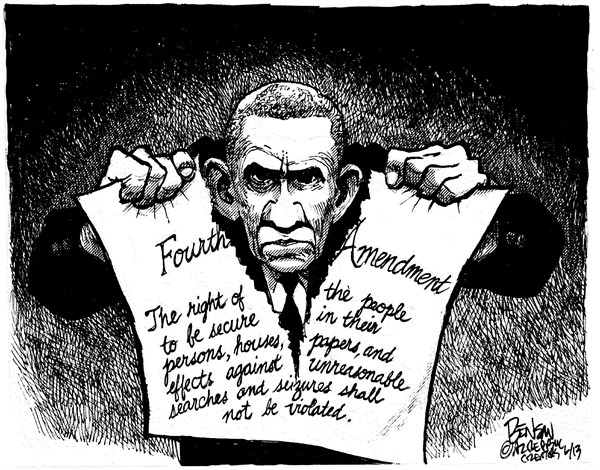Amendment IV
Text of the Amendment
The right of the people to be secure in their persons, houses, papers, and effects, against unreasonable searches and seizures, shall not be violated, and no warrants shall issue, but upon probable cause, supported by oath or affirmation, and particularly describing the place to be searched, and the persons or things to be seized.
Understanding the Amendment
Citizens of the United States are secure in their ownership and possession of personal belongings, private property, and any legal documentation verifying those assets. Those possessions may not be searched nor confiscated without evidence suggesting that a crime has been committed which warrants any such inspection. When issued, a legal warrant must specify the place(s) where law enforcement is permitted to search, as well as the individuals/items that are to be taken into custody.
History of the Amendment
Amendment IV was added to the Bill of Rights on Dec. 15, 1791 according to the Founders’ belief that freedom from government intrusion into one’s home was a natural right (one granted from God) and fundamental to liberty. This right was first identified nearly two centuries earlier by Sir Edward Coke who said: “The house of every one is to him as his castle and fortress, as well for his defence against injury and violence as for his repose.” It was the violation of this right in the Thirteen Colonies by the British Crown which partially motivated the American Revolution, and led to the drafting of the U.S. Constitution. Initially, this amendment was only applied to the federal government but was eventually extended to the states as part of Amendment XIV’s Due Process Clause.
Effects of the Amendment on the United States
When discussing the effects of this amendment on crime, it is necessary to discuss the “exclusionary rule”, which pertains to police searches conducted in violation of the amendment. This rule dictates that should an officer conduct a search or seizure without probable cause (unlawfully), any evidence acquired against a suspect during that search would be suppressed during the trial. Some argue that this is too mild a consequence for law enforcement officers who perform illegal searches, however others claim that our criminal justice system would deteriorate with harsher punishment.
Effects of the Amendment on Me
Many people, myself included, thoroughly appreciate the fourth amendment. It provides a necessary security to U.S. citizens (in theory, perhaps not always in practice), however there do seem to be certain dangers surrounding this amendment. Assurance of the right to private property is integral to the basic functions of a capitalist economy, but it is necessary to implement legislation in conjunction with this amendment which monitors and limits commerce so as to prevent abuse of the lower class by corporate vampires.

Like the Third Amendment of quartering, the Fourth Amendment gives me another right of privacy, but in the case of unreasonable seizures and searches. However, since I am still a high school student, my Fourth Amendment constitutional rights are limited. In New Jersey v. TLO (1985), the Court said that in an educational setting, searches and seizures can be conducted through reasonable suspicion. Schools can do such things due to a doctrine called in loco parentis. Tinker v. Des Moines (1969) further limits our Fourth Amendment rights by saying that our expression of rights cannot interfere or disrupt the school environment. Although these interpretations seems like it could create problems, these limited rights for minors and students would make sure that I, as well as other minors and students, do not use the Constitutional rights to break school conduct or other form of law that dominates us.
ReplyDeleteThe fourth amendment today has been greatly abused and I believe that every citizen should clearly know their rights in this amendment. Personally, I have read many stories about teens that live in high crime rates that have been racially profiled and put through multiple events of illegal searches. Many law enforcement officers today, without further addition to the amendment, believe that racial profiling is justified and treat people differently based on stereotypes. I believe that an addition to this amendment is needed or consequences should be produced for the illegal search and seizures. Furthermore, penalties and proper background checks should all be included in protocols in major or minor searches.
ReplyDeleteI agree, and it's not just teens, young adults (twenties) are also being targeted. Take into consideration the NYPD's "Stop n' Frisk" policy. There was a story of a young adult that was targeted to the stop and frisk policy on more than 5 different occasions. Someone needs to draw the line on the application of the fourth, or else someone else is going to gouge one out.
Delete